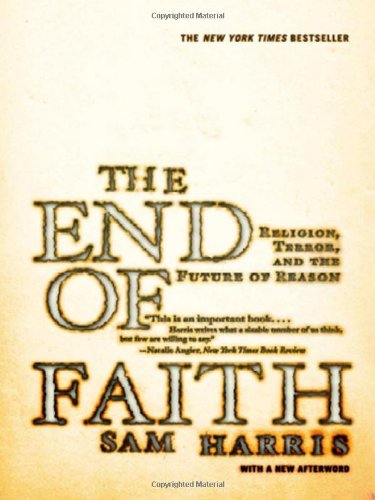The End of Faith: Religion, Terror, and the Future of Reason
Natalie Angier wrote in The New York Times: “The End of Faith articulates the dangers and absurdities of organized religion so fiercely and so fearlessly that I felt relieved as I read it, vindicated….Harris writes what a sizable number of us think, but few are willing to say.” This important and timely book delivers a
Natalie Angier wrote in The New York Times: “The End of Faith articulates the dangers and absurdities of organized religion so fiercely and so fearlessly that I felt relieved as I read it, vindicated….Harris writes what a sizable number of us think, but few are willing to say.”
This important and timely book delivers a startling analysis of the clash of faith and reason in today’s world. Harris offers a vivid historical tour of mankind’s willingness to suspend reason in favor of religious beliefs, even when those beliefs are used to justify harmful behavior and sometimes-heinous crimes. He asserts that in the shadow of weapons of mass destruction, we can no longer tolerate views that pit one true god against another. Most controversially, he argues that we cannot afford moderate lip service to religion; an accommodation that only blinds us to the real perils of fundamentalism. While warning against the encroachment of organized religion into world politics, Harris also draws on new evidence from neuroscience and insights from philosophy to explore spirituality as a biological, brain-based need. He calls on us to invoke that need in taking a secular humanistic approach to solving the problems of this world.Sam Harris cranks out blunt, hard-hitting chapters to make his case for why faith itself is the most dangerous element of modern life. And if the devil’s in the details, then you’ll find Satan waiting at the back of the book in the very substantial notes section where Harris saves his more esoteric discussions to avoid sidetracking the urgency of his message.
Interestingly, Harris is not just focused on debunking religious faith, though he makes his compelling arguments with verve and intellectual clarity. The End of Faith is also a bit of a philosophical Swiss Army knife. Once he has presented his arguments on why, in an age of Weapons of Mass Destruction, belief is now a hazard of great proportions, he focuses on proposing alternate approaches to the mysteries of life. Harris recognizes the truth of the human condition, that we fear death, and we often crave “something more” we cannot easily define, and which is not met by accumulating more material possessions. But by attempting to provide the cure for the ills it defines, the book bites off a bit more than it can comfortably chew in its modest page count (however the rich Bibliography provides more than enough background for an intrigued reader to follow up for months on any particular strand of the author’ musings.)
Harris’ heart is not as much in the latter chapters, though, but in presenting his main premise. Simply stated, any belief system that speaks with assurance about the hereafter has the potential to place far less value on the here and now. And thus the corollary — when death is simply a door translating us from one existence to another, it loses its sting and finality. Harris pointedly asks us to consider that those who do not fear death for themselves, and who also revere ancient scriptures instructing them to mete it out generously to others, may soon have these weapons in their own hands. If thoughts along the same line haunt you, this is your book.–Ed Dobeas







Comments